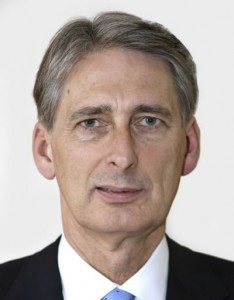Foreign ministers’ meeting in Hiroshima: Written interview with Philip Hammond, U.K.’s foreign minister
Apr. 6, 2016
Do you support “a world without nuclear weapons”?
Yes I do. We firmly believe that the best way to achieve “a world without nuclear weapons” is through negotiated step-by-step multilateral disarmament within the framework of the Nuclear Non-Proliferation Treaty (NPT). We will continue to work with partners across the international community to prevent proliferation and to take tangible steps towards a safer and more stable world, in which countries with nuclear weapons feel able to relinquish them.
What hopes do you have for the foreign ministers’ meeting?
I am looking forward to speaking frankly and in detail with my G7 colleagues about some of the most pressing matters of international peace and security: from the ongoing situation in Eastern Ukraine; to the various security issues in East Asia; to the urgent threat posed by terrorism. Addressing these issues requires good communication between partners and resolute commitment to take action. I am sure that we will be able to agree on common positions on a number of important topics.
Have you visited Hiroshima before?
This will be my first visit to Hiroshima. I was last in Japan in January. I did not have the opportunity to travel outside the Tokyo area then. It was in the days after the latest nuclear test by North Korea, which was a stark reminder of the security challenges we continue to face in this region (East Asia) and the need to keep working together to address them.
I would like to hear from Foreign Minister Kishida more about the history of his city, which will be an opportunity to experience first-hand the impressive way in which the people of Hiroshima have recovered and rebuilt their city since the end of World War II.
Do you have any suggestions as to what the youth of Hiroshima can do to promote peace?
Everyone, young and old, in Hiroshima and elsewhere, can make a contribution whether in their community or on a larger scale – and it is for each individual to decide how to do so.
The UK approach has been to stress the importance of an international order based on rules not force, to meet the global target of spending 0.7% of GDP on aid to other countries, and to meet the NATO target of spending 2% of GDP on defense. We think all of those are important contributions to securing prosperity, peace, and security.
(Originally published on April 6, 2016)
Read the full interview here.
Yes I do. We firmly believe that the best way to achieve “a world without nuclear weapons” is through negotiated step-by-step multilateral disarmament within the framework of the Nuclear Non-Proliferation Treaty (NPT). We will continue to work with partners across the international community to prevent proliferation and to take tangible steps towards a safer and more stable world, in which countries with nuclear weapons feel able to relinquish them.
What hopes do you have for the foreign ministers’ meeting?
I am looking forward to speaking frankly and in detail with my G7 colleagues about some of the most pressing matters of international peace and security: from the ongoing situation in Eastern Ukraine; to the various security issues in East Asia; to the urgent threat posed by terrorism. Addressing these issues requires good communication between partners and resolute commitment to take action. I am sure that we will be able to agree on common positions on a number of important topics.
Have you visited Hiroshima before?
This will be my first visit to Hiroshima. I was last in Japan in January. I did not have the opportunity to travel outside the Tokyo area then. It was in the days after the latest nuclear test by North Korea, which was a stark reminder of the security challenges we continue to face in this region (East Asia) and the need to keep working together to address them.
I would like to hear from Foreign Minister Kishida more about the history of his city, which will be an opportunity to experience first-hand the impressive way in which the people of Hiroshima have recovered and rebuilt their city since the end of World War II.
Do you have any suggestions as to what the youth of Hiroshima can do to promote peace?
Everyone, young and old, in Hiroshima and elsewhere, can make a contribution whether in their community or on a larger scale – and it is for each individual to decide how to do so.
The UK approach has been to stress the importance of an international order based on rules not force, to meet the global target of spending 0.7% of GDP on aid to other countries, and to meet the NATO target of spending 2% of GDP on defense. We think all of those are important contributions to securing prosperity, peace, and security.
(Originally published on April 6, 2016)
Read the full interview here.








